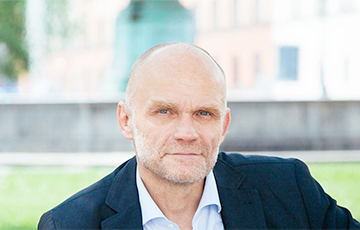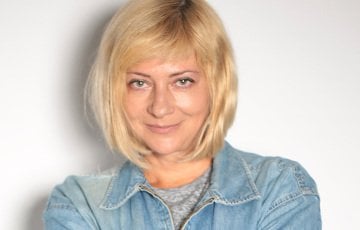French MP: Belarusians Are Europeans Chagall Could Not Have Been Born In Moscow
8- 27.08.2024, 10:39
- 8,034

Photo: francaisaletranger.fr
Why Belarus's place is in the EU.
French MP Frédéric Petit talks about the fate of Belarusian political prisoners almost every day on Twitter.
In an interview with Charter97.org, he explained why he supports the Belarusian resistance, the deep European roots of Belarusians, and the future of Belarus in the European Union.
— You are running an online solidarity campaign with political prisoners in Belarus. How is it going and for how long?
— In 2020, there were only a few politicians in France who were interested in the events in Belarus. I immediately started to sound the alarm, to speak out — in the first few weeks there was such an immense rhythm. I quickly realized that if you give information about one prisoner daily, it will last more than a few years. I am trying to ensure that this case is not forgotten. I am in touch with Belarusians in Paris, Warsaw, Vilnius, I am fighting for symbolic things, for human things.
— Every day for four years, you publish new information about yet another political prisoner in Belarus?
— Yes, every day. I take advantage of the fact that I have almost 15,000 followers in the West, who do not know this region well. They are interested for other reasons, but they see that every day I say: "Don't forget that there is this person, and also this person, and this one too", - every day there is one new face on Twitter. As a result, people from France and Germany are starting to realize what is happening.
Of course, this is not the only thing. I don't like this word "internet campaign", because I am a politician from these territories, I made speeches in the parliament, I officially observed the elections for the Belarusian Coordination Council. I do symbolic things, also operational things, to show that this issue is also ours.
— And how did you decide to work on the Belarusian case at the very beginning?
— I have been involved in similar issues for 40 years. I saw the creation of the European Union. This is a very important thing, a very unique, beautiful project.
First time I came to Poland was in 1986. I know this country very well and the neighboring countries, so-called "Eastern Borderlands". I lived in Lithuania, worked in Ukraine, worked in Donbas, even did a professional mission in Belarus.
I know what "The Polish-Lithuanian Commonwealth from the Baltic Sea to the Black Sea" stands for, and for me it is not for show — for me it is a proto-European Union. In the West, this story is not well-known — that in Europe there was such an effort: although there were conflicts and misunderstandings between the peoples, but you can try to create some form of a common living. Of course, the European Union is the best, the most durable form of coexistence, but those were also different times. And for me, what happened to the Polish-Lithuanian Commonwealth, what is happening today with the war in Ukraine, with the dictatorship in Belarus — this is a very deep European history, the history of the European Union: "I can and want to live together with my enemy; he is the enemy of my great-grandparents, grandparents, parents, but we will live and work together." Of course, for example, the German-Polish-French Weimar format or the history of the Balkans is also important for the history of the European Union.
1️⃣3️⃣7️⃣6️⃣prisonniers politiques actuellement au Bélarus. Ne les oublions pas.
— Frédéric Petit 🇺🇦 (@fpetitAN) August 24, 2024
Un jour, un visage, un parcours ⚪️🔴⚪️
Aujourd’hui, Yahor Volkau, détenu depuis le 3 février 2024 car il a osé s’opposer au régime criminel de Lukashenka. Une vie brisée❗️👇🏻
Il a été arrêté en vertu… pic.twitter.com/FTwMFpCTRm
— Do you consider the Polish-Lithuanian Commonwealth (which included parts of the territories of present-day Poland, Lithuania, Ukraine, Belarus) as a project similar to the European Union?
— Of course. As in the history of France and Germany, it was based on the principles: "We fought each other, you are my enemy, or you have other interests, but we can try to work together. We will not resolve this because you are stronger or you are fatter. We will solve it together. We will adapt".
I would like to remind you that at least several nations lived in the Polish-Lithuanian Commonwealth: Poles, Lithuanians, Ukrainians, Belarusians, Jews, Tatars. For example, Trakai, a city 10 kilometers from Vilnius, was a Muslim city.
— Could you say a few words about yourself?
— In France, we have voting districts for the French living abroad. I am elected to the National Assembly by the French, who live in Germany, Central Europe and the Balkans — and they elected me for the first time in 2017. As soon as I came there, I understood firsthand, that the French, even the President, even the government, do not know exactly what is happening in these regions and what does it mean, for example, common defense. How can you architect a common defense with the Poles without looking to the East? It is impossible, it must be done. It does not mean that you have to fight the Russians, but you have to understand what had happened there, what the history is. For me, of course, it was very important right away.
Returning to Belarus, in July 2020, I was the only one in Paris who spoke about those first marches — and that was before the elections. Once I tried to talk on French television about what was happening in Minsk two weeks before the elections, and people said, "Well, that is far away, something we don't know about …" Slowly, over the years, the French public began to understand that this is very important. Of course, when the war broke out, many people already understood that this is our business, this is our Europe. This is not imperialist Europe, this is Europe of cooperation. There are two models. Napoleon was the model of the imperialist model, and we are fighting for the model of cooperation. And now the Kremlin is fighting for the imperialist model: "I am stronger. I will do as I want".
— Russia's unprovoked full-scale aggression in Ukraine - is this a continuation of the war between imperialism and the alternative model?
— In order to live peacefully, to develop, for the sake of the happiness of my children and grandchildren, do I need to destroy my enemy? Can I try to do something else, as a person? This is the fight.
In Paris, no one knows about it, but there is a Russian saying "Russia's border doesn't end anywhere". Russia has no borders - it is not me who says that, they say it about themselves: they have no border! How can you cooperate if there is no border? Border is not a wall — border is a responsibility. It is just like dealing with a neighbor: I am responsible up to here, and you are responsible from there on. There cannot be responsibility if there is no border. He who says "I have no border" or "My border is where my army is", — we cannot cooperate with him. He is an imperialist, and we have to fight him — in the name of the idea of the European Union "we are 27, but we will work together". Germany, Italy, France, Lithuania, Malta have different interests, but they will work together. That is the principle and that is the idea which was attacked by the Kremlin.
1️⃣3️⃣6️⃣6️⃣prisonniers politiques actuellement au Bélarus. Ne les oublions pas.
— Frédéric Petit 🇺🇦 (@fpetitAN) August 20, 2024
Un jour, un visage, un parcours ⚪️🔴⚪️
Aujourd’hui, Natallia Labatsevich, détenue depuis le 19 juillet 2024 car elle a osé s’opposer au régime criminel de Lukashenka. Une vie brisée❗️👇🏻
Natallia… pic.twitter.com/wfkokqeg7c
— Do you see the future of Belarus in the European Union?
— Yes. There are very symbolic things that may seem unimportant, but I think they are very important, because the culture is important. Once I had a long conversation with a member of the cabinet in exile and I asked in the end, "What can we do next?". He replied, "In France, whenever there is a painting by Chagall, one could erase "Russian painter" at the bottom and add "Belarusian painter". This was unthinkable to me, but it was also very symbolic, because I am convinced that Vitebsk - it was a European city. Chagall could not have been born in Siberia or Moscow - it would be something different.
— In his book My Life Marc Chagall wrote that Paris is his "second Vitebsk".
— My Life by Marc Chagall - this is a European text, together with the fact that it does not avoid conflicts. Europe is not like "we agree because everything is beautiful" - no, there are conflicts. In my public appearances, when I explain the meaning of the European Union for me personally, I often say that the only place where there is no conflict is a cemetery, and I am in no hurry to be there. A mature person resolves his conflicts not as a child, not as an animal in a jungle or not like a boxer in a ring. We have to find humanistic ways to resolve conflicts, and that is what has been happening since the Polish-Lithuanian Commonwealth.
Mickiewicz — is he a Pole, a Belarusian or a Lithuanian? In addition, Mickiewicz participated in the Hambach Festival, when the Germans were choosing the flag. Mickiewicz was among them as a German. He kept to this format "we are different, but we have to work together" - it is the same story. The best format is the European Union today - let's say, not the worst, not finished.
In the situation after the elections in Minsk in 2020 - it was natural for me to continue explaining, speaking out, reminding that what is happening there is not a distant story, but some problems somewhere in the world. No. It is our story.
In Gdańsk, in the Solidarity Museum, there is a flag of Polish Solidarity. Since 2020, they have also added a white-red-white flag with a signature in Belarusian - it is the same story.
— What would you like to say to the relatives of Belarusian political prisoners who will read this interview?
— It will take a while, but in the end, democracy always wins.











